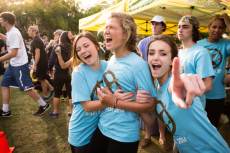Club Spotlight: Sustainability Program
For more than 15 years, the Rollins Sustainability Program has implemented campus-wide efforts to conserve resources and preserve our environment.
By Stephanie Rizzo ’09
April 21, 2021

America’s most beautiful campus is conspicuously free of waste and full of environmental stewards working to keep Rollins’ carbon footprint as light as possible. Thanks to the focused efforts of Rollins’ Sustainability Program, the College is continually recognized as one of the nation’s greenest colleges for everything from our Fair Trade practices to our commitment to alternative transportation.
For more than 15 years, the Sustainability Program has spearheaded the campus-wide effort to improve the infrastructure of support for environmentally friendly initiatives. It has revolutionized sustainable practices on campus and inspired countless students to carry on the legacy of the program as they move into the global workforce. It also provides a solid foundation of hands-on experience in everything from farming to grant writing for anyone who wants to get involved—whether that’s environmental studies majors or non-majors who are passionate about sustainability and conservation.
From our very own urban farm to year-round events like e-waste drives and lake cleanups, explore how the Sustainability Program is creating an ecosystem of positive change at Rollins and beyond.



The Scoop
The Sustainability Program has its roots in the recycling initiative that was started in 2001 by a small group of faculty and students, including Ann Francis ’01, who was just finishing up her degree in environmental studies. Francis came on as an advisor for the recycling pilot effort and went on to helm the Sustainability Program, facilitating everything from the removal of plastic straws to the campus bike share program during her tenure.
“The program just grew and grew,” says Francis. “When I moved into a position in the environmental studies department, I took the program with me. Pretty soon we were taking on more initiatives, and I had to hire more student coordinators. We started with two, and now we have eight. Each coordinator works as part of a two-person team to oversee a different sustainability initiative.”
Among the Sustainability Program’s most notable accomplishments is becoming Florida’s first designated Fair Trade campus in 2013 thanks to the combined efforts of the EcoRollins student organization, the Sustainability Program, and campus retailers. From the Rice Family Bookstore and the Cornell Fine Arts Museum to Dining Services and even the Athletics department (think Fair Trade balls at soccer and volleyball practice), Rollins is committed to purchasing environmentally sustainable products that don’t come from sweatshops or child labor.
Other successful initiatives on campus include the bike share program, which offers a fleet of 44 bicycles for checkout through Olin Library, the 900-square-foot urban farm that supplies Dining Services and local restaurants with organic produce, and the strategically placed hydration stations across campus that have saved over 2 million plastic water bottles since 2012.

Snapshot
Just in time for Earth Day, dozens of Tars gathered on the shore of Lake Virginia toting hundreds of native aquatic plants. Some were students in environmental studies professor Emily Nodine’s course Springs, Swamps, and Sinkholes, which explores the unique ecology of Florida waterways, while others were volunteers who heard about the initiative through the Sustainability Program. These green guardians waded into the shallows and, one by one, carefully removed a protective layer of burlap from the bottom of each plant to expose a delicate root ball before gently placing each plant into the water at the shoreline, burying the exposed roots in the sandy bottom of the lake.
This shoreline restoration project was the brainchild of Jason Makris ’23, a Sustainability Program coordinator who works on the Rollins urban farm. He spearheaded the application for funding from the City of Winter Park’s “Keep Winter Park Beautiful & Sustainable” Advisory Board, which awards an annual series of Green School Grants to institutions that submit proposals in support of sustainability efforts. Rollins has received the award twice before, each time for its efforts in starting and maintaining the bike share program.
“This year, instead of applying for funding for an existing program, I thought we could try to solve a newer, more immediate problem,” says Makris. “Construction on the new Lakeside Neighborhood has impacted the southeast shoreline of Lake Virginia, so we focused on documenting the decline in the area.”
To help with the proposal and serve as an additional resource, Francis tapped alumna Caroline Chomanics ’19, COO and program manager of Fleet Farming, an urban agriculture program under the umbrella of Orlando-based nonprofit IDEAS For Us. She hosted a virtual workshop on shoreline restoration techniques and came to campus to help with the planting.
The funding was approved, and the plants were purchased from a local nursery specializing in Florida native plants. Volunteers placed over 750 plants representing five different native species along the lakeshore, restoring campus’ most beautiful view to its original glory and planting the seeds of a more balanced, resilient shoreline ecosystem.

What I’ve Learned
Mia Brady ’22 serves as lead sustainability coordinator for the Sustainability Program, where she helps oversee initiatives and manage the other student coordinators in their pursuit to keep these initiatives going strong. Her work on campus led to an internship with the City of Winter Park as a sustainability intern.
“What I really appreciate about the work I’ve done and the opportunities it’s afforded me is the perspective,” says Brady. “I see things pertaining to sustainability and the environment differently than I did before college, and that’s because Rollins focuses on finding solutions to these types of issues rather than just identifying problems.”
This summer, Brady will travel to the Santa Monica Mountains in California to complete an internship with the National Parks Service, where she hopes to put her unique perspective and problem-solving ability to work in a new way monitoring native plants and doing habitat restoration.

Indelible Impact
After learning about the zero-waste movement while studying abroad for a semester in Australia, Morgan Laner ’18 came back to Rollins laser-focused on waste management. Through the Sustainability Program, she worked closely with dining services and facilities to revamp the campus’ recycling program and implemented effective ways to educate her fellow students and get them involved. Her newfound interest in the zero-waste movement led to an internship at the Post Landfill Action Network, a nonprofit that works with college students to steer their schools toward the ultimate goal of zero waste. Now the environmental studies major is working as a zero-waste coordinator at the University of Texas at Austin.
“The opportunities I had at Rollins set a great precedent for how to make change in the bigger world,” says Laner, who credits Francis as one of her mentors with whom she was able to create long-lasting change on campus. “Rollins has prepared me to work hard, connect with people, and keep an open mind.”
Francis just celebrated 25 years at Rollins and is set to retire at the end of this semester, leaving behind a major legacy as the head of the Sustainability Program and a relentless champion of our planet earth.

Did You Know?
This year, the Rollins urban farm sold over 75 pounds of fresh produce to dining services for use in dozens of delectable dishes.
- Categories:
- Environmental Studies |
- Student Organization |
- Campus Life
Keep Exploring
From sustainability initiatives to esports teams, there are more than 150 students organizations on campus.

Recent Stories
February 25, 2026
Rodelo ’27 Selected for National LEAD 250 Democracy Fellowship
Stephanie Rodelo ’27 has been chosen for the Leadership, Engagement & Action for Democracy (LEAD) 250 Fellowship, a new civic fellowship program.
February 24, 2026
Pool ’26 and Greenberg Co-Author Book Chapter on Culinary Diplomacy
Public policy and political economy major Joseph Pool ’26 collaborated with religion professor Yudit Greenberg on research exploring how shared meals can bridge cultural and religious divides—work now published in a new academic volume.
February 20, 2026
What It’s Like … to Get Out of My Comfort Zone
From her first time traveling abroad to a recent service experience in the Everglades, Taylor Evans ’28 reflects on how stepping into the unknown has become one of her greatest teachers.

